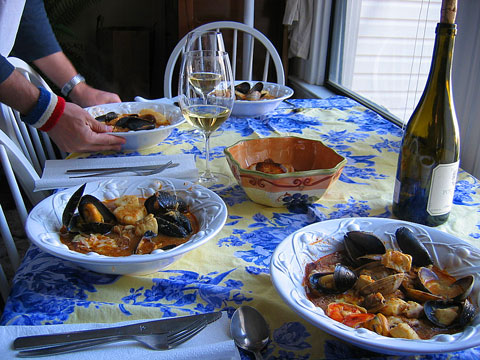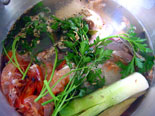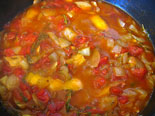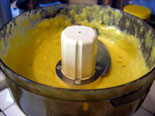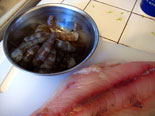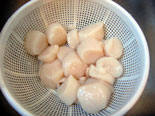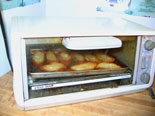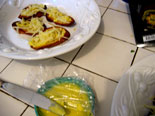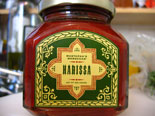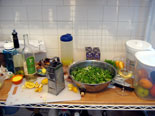June 18, 2004
Is My Blog Burning V: Fish!
Wena hosts IMBB this weekend, scheduled for the 20th, but as I am going to be awayI agonised quite a bit over whether to make a Cioppino or a Bouillabaisse. I had my heart set on some sort of seafood stew, and both are of the same genesis -- fisherman's food, a melange of what was cheap and plentiful, made with creatures that were not always desirable to the city elite. As a San Franciscan, I rather felt obligated to make something regional, something resonant with my beautiful adopted city - I researched Cioppino, and read Reed Hearon and Peggy Knickerbocker's take on the recipe. In the end, it was my squeamishness and love for croutons and rouille that changed my mind.
For the the Rose Pistola account started thusly, with the killing of fresh Dungeness Crab (seasonal and fat and fresh in San Francisco in November -- apparently the only time that restaurants of Chez Panisse calibre put it on the menu) -- by either sharply slamming its underside along the edge of your heavy cutting board or the sink; or sharply stabbing the creature between the eyes with a sharp ice pick or other similar instrument. Ack. As omnivorous as I am, I couldn't bring myself to do it (just yet) and so I chose Bouillabaisse. I was rather in a mood for nuance: fennell and orange peel and rich aioli, rather than the straightforward robust heartiness of bold tomatoes and onions and garlic. Not to say that Bouillabaisse didn't have any of the latter; it did, indeed, but this 3-part recipe, which included the challenge of making a fumet, or fish stock as a base, intrigued me; and I opted for the work-and-shopping intensive, in lieu of the slaughtering intensive.
So I chose Susan Woodward's recipe, and made a few slight modifications ... I did my shopping in 3 waves - partly because I wanted an excuse to go to Berkeley Bowl for my produce, and because I wanted to try out the Richmond Seafood Market I had visited some weeks ago. Though I'm Chinese, I'm embarrassed to say that I can't speak any at all, and not trusting that I could make myself understood to the fishmongers in the Richmond, I opted to obtain the fish scraps at Berkeley Bowl instead. Hardly were the words out of my mouth - "I'm going to make a fish stock..." when my fish guy nodded and headed to the back immediately. "Let me check." He came back with a lovely huge handful of fish collar - a perfect 3 lbs. I also purchased a filet of cleaned New Zealand sea bass there, along with some PEI mussels, and the other ingredients for the soup. I got all the other seafood - the shrimps, (lovely plump mini tiger prawns, really), scallops (my favourite shellfish), and clams at the Richmond Seafood Market, on Clement & 6th.
Part I: The Fumet
[[My edits are in these double brackets]]
Start with the shells from the shrimp and whatever bones, heads, fins and skin you can come by. A yellowtail collar is a fine contribution, too, although the fillet of this fish is not the best suited to this soup. [[I had 3 lbs of fish collar as well as the shells from the shrimps. Not sure what kind of fish it was, though.]] Wash everything in copious running water, then cover with two quarts of water [[I used about 12 cups.]] and add:
- 1 teaspoon of fennel seed [[I used about 1& 1/2 tsp.]]
- 3 bay leaves [[4]]
- several [[generous]] grinds of black pepper
- 10 sprigs of parsley, not chopped [[10-12-15?]]
- 1 teaspoon salt [[2 tsp. and several pinches]]
- 1 leek [[this is my addition]]
and boil it all together gently for 30 minutes. Strain this broth and discard everything but the broth. [[After straining I actually reduced the lot quite a bit -- perhaps down to 8 cups instead of 12.]]
Then prepare the vegetable body of the soup:
- 2 or 3 large onions, chopped in bite-sized pieces [[3]]
- 10 cloves of garlic, crushed [[12-15?]]
- 2/3 cup of olive oil [[approx.]]
- 1 teaspoon fennel seed, or a small bulb of fennel, chopped [[I used a fennel bulb.]]
- 1/2 cup parsley, chopped fine
- 1 teaspoon salt [[mas or menos...]]
Fry all of this together over medium heat in a large pot until the onions are well wilted and the garlic is cooked a bit. Then add:
- 1 large can crushed tomatoes
- 2 teaspoons thyme [[You know those packets of fresh thyme you buy at the market? I put the whole lot in, separated into sprigs.]]
- 3 strips of peel from an orange, about 1/2" x 3", orange part only, no white flesh
- 3 bay leaves [[more bay leaves! yay!]]
- 2 teaspoons ground black pepper
- 1 teaspoon saffron
- 2 teaspoons harissa sauce [[I'm chicken and used only 1 tsp. Adjust according how hot-spicey you like your food.]]
- 1 cup white wine [[this is my addition]]
and simmer about 20-30 minutes. Then add the fish broth prepared earlier, and one pound of inexpensive fish fillets -- frozen cod [[which I obtained at Trader Joe's]] is fine. Cook until the fish is done. Then remove the bay leaves, thyme sprigs and orange peel (but save them), puree the soup in batches (blender gives the best result) and return the soup and the bay leaves and orange peel to the pot and one small, peeled 1.5" potato to the pot and simmer another 30 to 45 minutes.
I used a food processor here, since I don't have a blender, and my advice is this - puree just the fish - with very little liquid and some of the mushed vegetables a little at a time if using your Cuisinart. I got a chunkier, unevenish texture at the end, but it was still good.
The pureed soup will be a light orange color, but it will develop into a fine colorado red as it simmers, and the flavor will develop also. After 30 minutes or so, taste the soup and correct the seasoning for salt, pepper, and harissa. To this point you can prepare the soup ahead. Fish out the cooked potato and the thyme stems, and freeze it if you are not going to use it within 24 hours.
Part II: Rouille & Crostini
For the rouille I followed a combination of recipes, not the one provided by Susan's recipe above. Refrigerate if you don't serve the meal within a half-hour of making the rouille.
- 3 egg yolks
- 1/2 cup olive oil
- 5 garlic cloves
- 1 pinch saffron
- the cooked potato from above
Slice a small baguette into fairly thin slices, [[brush with olive oil,]] and toast them lightly. You will need 4 to 6 pieces for each guest, assuming each guest will have seconds and that two to three will fit in your soup plates. The toasts can be prepared ahead, too, as the bread should be fairly thoroughly dry when they are finished toasting. Store them in a zip lock bag if you are not going to use them the same day. [[My oven at this point chose to crap out on me, so I had to use our toaster oven. Worked pretty well, though.]]
Part III: Bouillabaisse!
When you are nearly ready to serve, heat the soup to a simmer, and put the shellfish and other fishes into the soup. Remember you have a pound of fish in the soup already, and aim for about 2 to 3 persons per pound of filleted or cleaned fish or shellfish. For 8 people I usually buy:
- 1 pound shrimp
- 1 pound scallops
- 1 pound seabass
- 2 dozen clams or mussels, or 1/2 pound of another fish but other varieties are fine, too. [[I used 1 dozen clams and 1 dozen mussels, cleaning them by soaking in several changes of cool water before cooking, and by trimming the beards from the mussels and scrubbing their shells free of barnacles.]]
Good candidates for this soup: seabass, halibut, red snapper, cod, ling cod, shrimps, scallops, clams, lobsters, mussels, and even sole. Basically, most shell fish and all white-fleshed sea fishes.
Bad candidates: swordfish, mackerel, tuna, yellowtail, bluefish, salmon, oysters, other oily fishes, squid and octopus, [[I would have added squid. Can't fathom why they're considered "bad" candidates...]] and all fresh water fishes.
Depending on the volume, the shellfish and fillets will cook in as little as 5 minutes. If there are many bivalves, they will take longer because their shells will cool the soup and it will have to come back to a simmer before the fish will cook.
Susan's last instructions: while the soup is cooking, grate about 1/4 pound of gruyere cheese, spread the little toasts with mayonnaise and dip each one in grated cheese. Put two or three in each bowl and ladle the hot soup over it. There is great danger here that the guests will discover how delicious the little toasts with spicy potatoey garlickly mayonnaise and cheese are and eat them up before you serve, so proceed with caution.
My friend Sara brought a yummy Pouilly Fuissée, and I made an easy, chopped salad of baby arugula and frisee (with simple lemon-shallot-vinegar dressing), e voila - a very simple, yet complexly assembled meal!
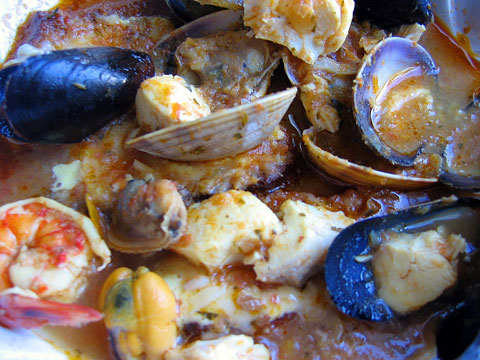
Posted by claudine at June 18, 2004 01:20 AM
| TrackBack
